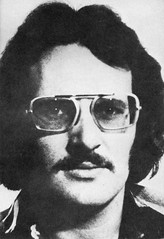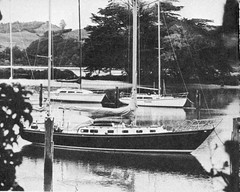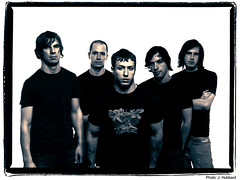The Brigadoon

New Zealand in October 1975 was a very different place. Rob Muldoon was about to be elected Prime Minister, Dragon had moved to Australia, carless days restricted petrol consumption, and the economy was in recession.
From this bleak situation grew one of New Zealand's greatest criminal episodes, a drug trafficking syndicate that would be dubbed 'Mr Asia'. When this was unravelled in 1979 it was exposed that Terrence John Clark, originally from Gisborne, was the head of the organisation. And his ultimate downfall came after the execution in England of one Christopher Martin Johnstone.
Johnstone, who had grown up in the Auckland area, was the one the Auckland Star investigation team headed by Pat Booth had suspected was the kingpin of the syndicate - to them, he was Mr Asia. He lived in Singapore from mid-1976, arranging shipments of heroin to various corners of the globe, helping to build Clark's empire into one of the biggest trafficking operations of its time.
It was in 1974 that the seeds of the syndicate were sown. Johnstone, then 23, had been looking for ways of supplementing his income from a job in a menswear store. Through colleague Greg Ollard (who would also lose his life to Clark) he gained a connection on the Dutch Straat freight ships. Central to this was 'Chinese Jack' - Choo Cheng Kui, who would arrange shipments of Thailand marijuana.
This took the form of ‘buddha' or 'Thai' sticks - highly compressed cannabis wrapped around a bamboo stick. "The local pot was being grown, but there wasn't a great deal of demand for it because the buddha sticks were just so superior,” an ex-dealer has said.
While his efforts in 1974 were successful, Johnstone was an ambitious man. He’d met a few similarly ambitious men, amongst them Peter Lawrence Miller, George Papaconstantinou, and Clark. It was Miller, Papaconstantinou and Johnstone who in early 1975 were suspected by police after a tip off of picking up narcotics dropped at sea. It was round about this time that various companies were set up under the 'Milltone' umbrella.
It was in August 1975 that Milltone Charters Ltd was established, a front for future plans involving the yacht Brigadoon. This 18-metre yawl had been built for Johnstone's father Brian, who had sold it several years before. Milltone Charters purchased the yacht for $50,000, and the company directors began organising their push for the big time.
Miller was to skipper the Brigadoon to Thailand to pick up half a tonne of Thai sticks in a deal brokered by Chinese Jack. The drugs were to be brought back to New Zealand where they would flood the burgeoning market. Clark's part in this arrangement was as a key distributor upon the yacht’s return. But while the expedition would ultimately be successful, it was fraught with misadventure.

Even before the Brigadoon had left Auckland, the New Zealand police were aware of the planned trip. Auckland's criminal fraternity being relatively small, word had got around. It wasn't just the police who were aware of it. Murray Williams of the Auckland Star team knew the trip was afoot, as he was friends with two of the crew.”
"They had this secret in common. Plans were already being laid to sail the Brigadoon to Thailand, pick up a 450,000-stick marijuana consignment and slip it back into New Zealand. The vessel was on the hard at Westhaven, one of Auckland's yachting centres, and the younger brother had been put in charge of provisioning and buying equipment."
The two brothers were Michael and Kevin Lampshire from Auckland's North Shore, who would join Miller and at least one other crewmember for the trip. They were wholly unqualified to attempt the excursion, having limited sailing experience between them, none of it on blue water, and virtually non existent navigational skills.
This didn't deter them from setting off on 26 August 1975, heading up to New Caledonia and Papua New Guinea through the Timor Sea. It was on the first leg, that things started to go awry. The crew's food had gone rotten, leaving them with little to eat. Upon landfall in Noumea, a crewmember had been caught shoplifting some food. New Zealand police monitoring the progress of the yacht received a call from the New Caledonian police about the arrest. Believing they would apprehend the crew upon their return, the New Zealand police advised them to let the crewmember go.
The next debacle came when the Brigadoon became trapped in a maze of coral reefs northeast of Noumea for over three weeks, due to Miller's poor navigation. They also ran aground numerous times, including three times in the Timor Passage.
After this nightmare leg, they crew were happy to get to Thailand. Moored in Bangkok, on the Chao Praya River, they were guarded by armed Thai police. Johnstone arrived in Bangkok to make the connection with Chinese Jack, and not long after the $30,000 needed to purchase the drugs was couriered in. It is believed this was the work of Andy Maher, the man later convicted of Johnstone's murder in Northern England.
Some of the crewmembers of the Brigadoon witnessed the production of the sticks in Udon, Eastern Thailand. Whole families working in the fields harvesting the drug, while others bound the heads to bamboo sticks and compressed them with a hydraulic press. 1000 sticks could be compressed into a block 3 centimetres by 18 centimetres for easy transportation.
The 400 kilograms of Thai sticks was ferried to near Bangkok, where it was loaded onto the Brigadoon under cover of darkness at the mouth of the Chao Praya River.
With its cargo loaded, the Brigadoon set off on the return journey, stopping east of Bangkok at Pattaya to collect supplies. Here they had a fault with their engine, forcing them to crudely resist the assistance of a cruising yacht that tried to help. Johnstone departed to New Zealand to prepare for the yacht's arrival. He was to return to Pattaya in 1979 however, where a heroin transaction went wrong, and he lost up to half a million of Clark's money. This directly led to his death.
The Brigadoon sailed slowly on towards to Indonesia. Now the next disaster occurred, as the Lampshire brothers contracted malaria, desperately requiring medical attention. Thinking better of making landfall in Indonesia with a hold full of Thai sticks, the illicit cargo was stowed on an unpopulated island. It had been Miller's intention to leave the forth crew member on the island to guard the haul, but he thought better of it. This proved a wise decision, as he wasn't able to return and pick it up for over three weeks.
Arriving in Makassar, on the Indonesian island of South Sulawesi, the crew were arrested for not having visas. They were held for three weeks, and with the brothers out of action due to their illness, this left Miller in a difficult situation. He had legal problems and no crew for the return journey. Johnstone was called back from New Zealand to attend to things.
In Makassar, Johnstone made the association of the Australian skipper of the Konpira Maru 15, salvage expert John Chadderton. It is alleged that Johnstone paid Chadderton $30,000 to tow the Brigadoon back to New Zealand. Chadderton, now living in Perth, admits to the tow, but says he was entirely unknowing of any criminal activity.
"All that happened was there was a tow of a vessel that obviously requested assistance. We did that. The boat abandoned the tow at sea, we returned to the vessel and they didn't want to know us. And I thought, well, what a pack of wankers these people were and I sailed on."
This may be true, but the Stewart Royal Commission of Inquiry Into Drug Trafficking that documented the Mr Asia saga after its downfall says Chadderton later established the Timor International Marine and Oceanographic Research Company with Martin Johnstone.
With the help of Chadderton, the Brigadoon sailed south through the Timor Passage to Gove on the tip of Australia's Northern Territory. Pat Booth's book The Mr Asia File says, "Marty Johnstone certainly looked the part of the company director from Sentinal Road in his three-piece suits - better to look smart than be cool in the Indonesian heat - and an apparently inexhaustible supply of cigars."
Johnstone departed the vessel in Gove to return to New Zealand, and the Brigadoon was on its final leg. Yet still the problems weren't over. After the tow was abandoned off the top of the North Island, the yacht ran aground at Taemaro Beach, and local people were enlisted to help.
Further down the coast where Johnstone and cohorts had been camped, the 39 coal sacks of Thai sticks were unloaded. By now it was late March 1976, and the Brigadoon had been away for seven months.
The police had in the interim given up on the surveillance. "I think the drug squad had put out some alerts and were waiting for more information," says retired detective Brears Basham. "But I don't think they ever gave up. Information had dried up, no one knew where it was, nothing had arrived back in the country, so they presumed something had gone wrong or it had gone somewhere else. But once there was a big flood of sticks they didn't take long to put one and one together."
The product - with a value of between 3 and 5 million dollars -finally hit the Auckland streets. The profits trickled in over the next few months, providing the financial basis for the future operations of the Mr Asia syndicate.
And the Lampshire brothers, abandoned with malaria in Makassar? They would have been in trouble if the younger one hadn't had a good voice, picking up a gig in Zed's Hotel as a cabaret singer. After a number of months the New Zealand government paid their airfares home.
Gavin Bertram.


